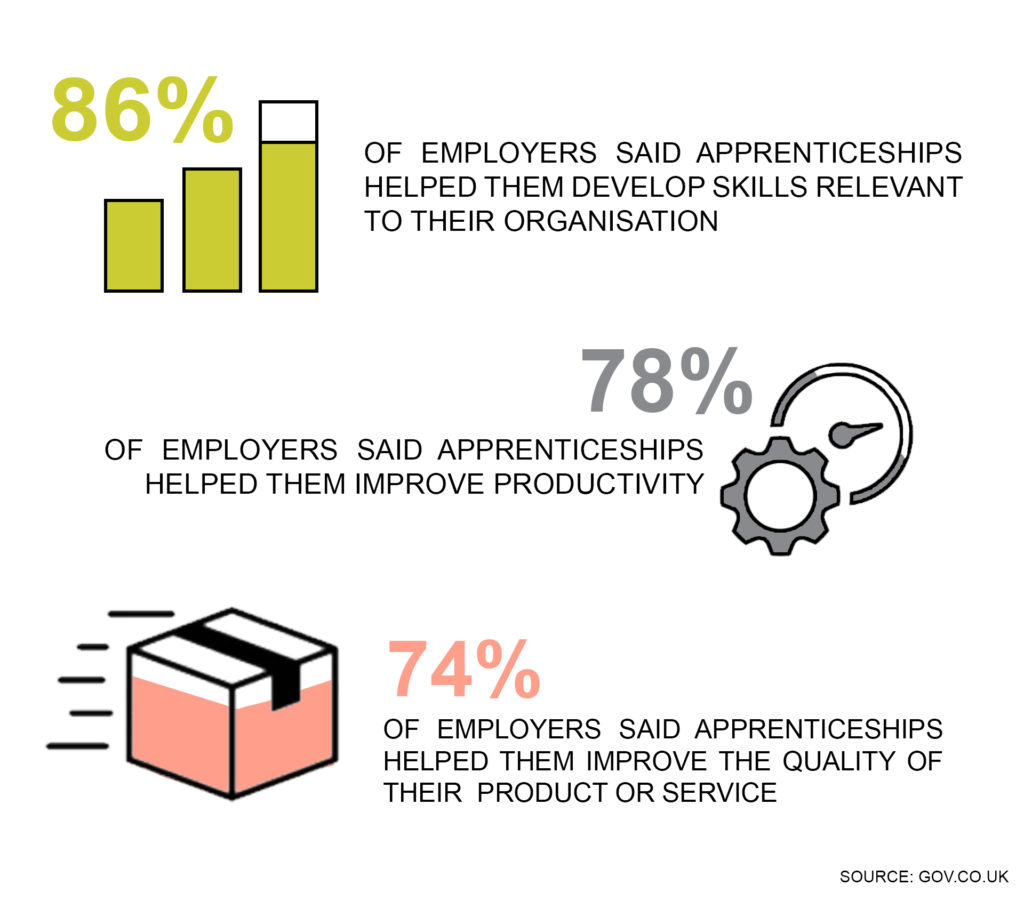Help Your Career and Your Business with Apprenticeships
If you are looking to kick start a career by gaining on the job experience and training or looking to invest into your company and plan for the future, Apprenticeships are just for you.

Learners:
Apprenticeships are for anyone aged 16 and over and are a great way to start or progress your career. An apprenticeship is a real job role where you will learn, gain experience and get paid. You’re an employee with a contract of employment and holiday leave. It can take one to six years to complete your apprenticeship depending on which apprenticeship you choose, what level it is and your previous experience. It is all funded by the government and your employer. You don’t require a student loan or tuition fees.
To become an apprentice, you have to be:
- 16 and over
- Not already in full time education
- Live in England
As an apprentice you’ll get:
- Learning and training for a specific role
- Get paid and receive holiday leave
- Get hands-on experience in a real role
- Study time for at least 20% of your working hours
- Complete assessments during and at the end of your apprenticeship
- Being on a career path with lots of future potential
Education level:
Intermediate – level 2 – GCSE’s
Advanced – Level 3 – A Level
Higher – Level 4, 5, 6 and 7 – Foundation degree and above
Degree – Level 6 and 7 – Bachelor’s or master’s degree
To apply for an apprenticeship, you will need to create an account with find an apprenticeship service. You can also apply directly on an employer’s website or through a training provider. Once you have found the right apprenticeship, you will need to have a CV and a cover letter to apply.
Apply for an apprenticeship go to: Find an apprenticeship – GOV.UK (www.gov.uk)

Employers:
Hiring an apprentice can benefit any business, helping with productivity and effective way to grow talent and develop a motivated, skilled and qualified workforce. You can adapt their training according to the needs of your business. Apprentices are motivated to learn new skills and it is a great way to expand and upskill your work force.
The government supports any business looking to take on an apprentice. During the 2021 budget more funding is being provided to business to take on apprentices. To start your process, you will need to register your business on the apprenticeship website, then you will need to choose a training course or training provider to help you with the training process.
During the apprenticeship, your apprentice will receive two different types of training, on-the-job and off-the-job training. On-the-job training is provided by you, the employer. They will be given training and supervision to help them perform the job you hired them for. Off-the-job training is delivered by a training provider during normal working hours. It will teach them knowledge, skills and behaviours to achieve occupational competence. This makes 20% of their working hours.
Things to consider:
- Choosing an apprenticeship training course
- Choosing the right level and skills
- Seeing the availability of training providers
- Employer reviews of training providers
- How you will communicate about the training provided
- What other employers think about their services
- What apprentices think about their experience
Working with a training provider:
Your chosen training provider will help you as much as possible and support you through the process of taking on an apprentice. It’s up to you how you work together and how you would like the relationship to be. A training provider can help with finding the right training. The recruitment and interviewing of apprentices and preparing your apprentice for the workplace. Making sure your apprentice is working in an appropriate environment and learning the relevant skills for your business.
At Free2Learn we can help you with training your apprentice. We are dedicated to having courses in key industries, that provide apprentices with the skills and knowledge to add value to any work place. To find out more contact: ray.shilling@free2learn.org.uk




